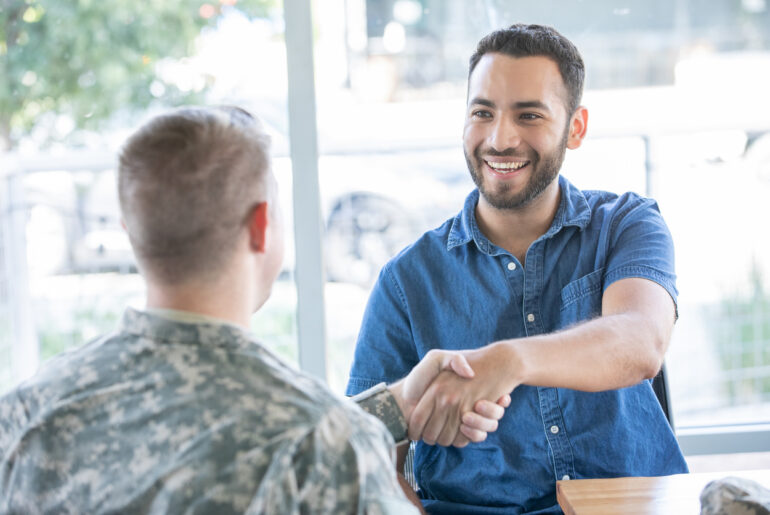The transition period a veteran experiences between exiting the military and beginning life as a student is filled with unique challenges. The reintegration into civilian life can be especially challenging if a veteran is trying to navigate the adjustment with the obstacle of a disability. Fortunately, veterans don’t need to travel the path alone. Many educational institutions offer programs designed to assist veteran students in obtaining the services they need to succeed academically. To help us understand the process of applying for disability accommodations, we spoke with Don Accamando, Director of the Office of Military and Veteran Students at Duquesne University.
Requesting Accommodations
If you’re interested in learning about the documentation process for requesting disability accommodations but don’t know where to begin, start by speaking with a trusted university staff member.
“In my role as director of the Office of Military and Veteran Students (OMVS), I help to connect veterans with Duquesne’s Office of Disability Services to ensure that pressing needs are directly addressed. In some cases, accompanying the student veteran to the office is necessary, and important,” says Accamando.
Disabilities aren’t just physical in nature. If you find yourself struggling visually, auditorily, emotionally, or intellectually don’t be afraid to ask for help. You may be entitled to receive specialized services to help you succeed.
According to Accamando, the most common accommodations veterans seek out include:
- additional time to take tests
- large print computer screen capability
- a quiet location to test
- latitude to miss class due to doctor’s appointments.
“Unfortunately, veterans are not always comfortable seeking help—that behavior is contrary to the warrior ethos. There is a certain amount of autonomy within the military to ‘get things done’. For some, admitting that they can’t ‘accomplish the mission’ casts doubt on that individual’s ability to do just that. Overcoming the stigma that an individual has specific needs requires the development of a bond or a degree of trust. Without trust or allowing time for conversations about special needs can compound a variety of issues that can affect the academic and social performance of the student veteran.”
Reaching out to university staff is the first step in the process for getting the help you need to succeed. They will be able to walk you through the documentation process and assist in obtaining classroom and testing accommodations if needed.
“Some students try to ‘muscle through’ these significant limitations, but this solo effort may lead to diminished performance, a dip in morale, and in some cases, end in failure.”
What is a VA Certifying Official? How can they help me?
“The University Certifying Official is the subject matter expert for all VA benefit issues and assists all GI Bill benefit users, regardless of the chapter, in the proper use and certification of those benefits. The Certifying Official works directly with the Veterans Administration to ‘Certify’ the veteran, or in the case of a transfer of benefit under Chapter 33 of the GI Bill, the dependent’s benefits.”
While the VA Certifying Official may be housed in a different location from university disability services, they are still a resource to approach with questions about how to find support services on campus.
Service animals welcome
According to the Americans with Disabilities Act, service animals are defined as “dogs that are individually trained to do work or perform tasks for people with disabilities.” Service animals may accompany students in classrooms, residence halls, and even in locations where food is being served.
“Service dogs and their handlers are protected by the Americans with Disabilities Act and, as such, are permitted in all dining facilities. Duquesne University currently has a student veteran enrolled who is paired with a service dog. He hasn’t experienced any challenges or issues on campus.”
It’s important to note that service animals differ from emotional support animals. Limitations may apply to the presence of emotional support animals on campus, and policies vary by school. Make sure to inquire about the regulations and documentation needed for emotional support animals if needed.
Remember, you’re not alone
Having a support system is vital to your academic success. But what if you don’t have a network of close friends or family members to rely on? Accamando encourages students to seek support from their peers by regularly visiting the Veterans Center on campus.
“Duquesne University maintains its longtime commitment to providing a variety of services for its student veterans and their dependents within the Office for Military and Veteran Students. There’s a comfortable Veterans Center on campus, where all members of the military and veteran student community are welcome to relax and connect. This is an important component of campus life for the nontraditional student veteran. The Center includes a VA Work Study office offering limited ‘work study’ positions for GI Bill users and a special quiet study space for all to recline to when studying in the Center becomes too challenging.”
Even if you’re not necessarily looking to socialize on campus, visiting a Veterans Center at your school could still be beneficial. As Accamado notes, there may be employment opportunities or financial awards available that aren’t advised across the entire student body.
Looking for more veteran student resources? Search the Military/Veteran category on our blog for an archive of articles featuring advice from veterans and campus staff.



